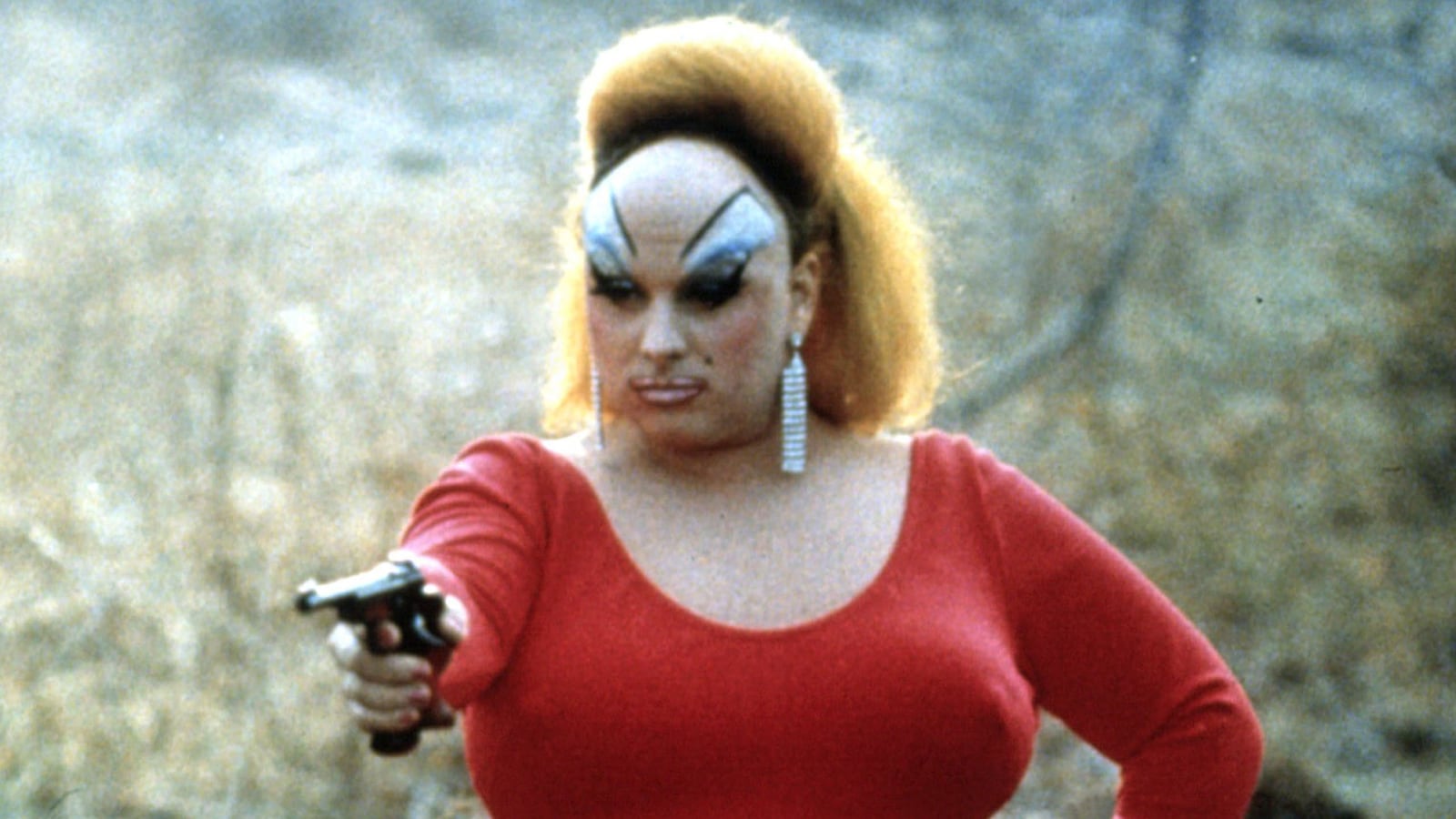One of the more peculiar ironies of notoriety is that the more a work is hyped as controversial, the less likely it is that you have actually seen the film and know it enough to extol or decry it. People have been talking about Pink Flamingos ever since naturalists expecting a documentary about birds have been known to come out of the theater vomiting. But what does the 1972 movie actually show? Poop, we’ve heard. Specifically, the drag queen Divine eating dog poo at the film’s end. It is director John Waters’s “exercise in poor taste,” as we’ve gathered from the tag line. It is a cult movie, a camp movie, a controversial movie, and a perverse movie. But what does that all mean?

If you were to actually sit down and watch Pink Flamingos, you’d find yourself plunged into a deliberate world of weird, as two families compete to be “The Filthiest People Alive,” and make a run at the title of being stupidest as well. The first third of a list of the film’s indefensible acts would go something like this: impregnating kidnapped women and selling the babies to lesbian couples, peddling heroin in inner-city elementary schools, crushing a live chicken while having sex, flexing one’s anus to the song “Surfin’ Bird.” The staged offenses are so numerous that they become numbing in abundance.
What is immune to this escalating bottom-feeding, and without which Pink Flamingos would be dumb and dull, is the magnetism of the film’s star, the 300-pound drag queen Divine. It isn’t simply that his image is more than over the top. That it certainly is—the decisive step was when cosmetician Van Smith shaved back Divine’s hairline in order to put on as much outrageous eye makeup on that large forehead canvas as possible. It is when Divine opens his mouth, and the psychotic anger inside his voice mixes with this campy anti-beauty, that you understand what kind of insurgency you are witnessing. It was simply high time for gays to be furious at the state of things. “Part outlaw, part serial killer,” Joshua Grannell (drag performer Peaches Christ) describes the character in Jeffrey Schwarz’s new documentary I Am Divine, which opened in New York this week. “A cinematic terrorist,” casting director Pat Moran remarked. Schwarz, who resurrected the forgotten gay film scholar Vito Russo in his first documentary, Vito, presents another love letter and deserved tribute. What becomes evident is that Divine had a thrilling appeal that was more than schlock shock—he had the talent to instill a sense of anger, desire, and humor in the audience, helping to put queer culture on the map. His triumph was unlikely, but he managed to overcome attempts to marginalize queer culture to become an icon of punk and disco. If he were still alive, it wouldn’t be RuPaul’s Drag Race today. As someone says in I Am Divine, Divine would be hosting the show.
Divine was born Harris Glenn Milstead in 1945 in Baltimore, Maryland, a “good little baby, always had nice manners,” his mother, Frances, said. A pediatrician told her that he was more “fem” than he was masculine. The chubby Glenn also loved to eat. When in high school the Waters moved down the street, John and Glenn became “two entwined pieces of energy,” as a friend said. The best thing about Schwarz’s film is how endlessly quotable everybody is. (Drag star Jackie Beat asks of Divine at one point, “Is she going to screw me or eat me?”) The funniest of all of them is the always articulate Waters, who said that he and Glenn discovered pot, and “that’s what changed everybody … you had irony, all of a sudden!” They even dropped LSD and watched the Ingmar Bergman horror movie Hour of the Wolf, already a surreal trip in its own right that you mentally enhance at your own peril.
Glenn started going to drag balls in Washington, but instead of being pretty and thin, he could only be obnoxious and fat. “They were so serious about being so competitive,” he said. “I thought I would just have fun.” But he discovered that he received so much more attention wearing tight clothing—it was more fun making fun of drag than actually trying to be drag. Waters began making short films, and cast Glenn in Roman Candles (1966), calling him Divine—because he was just that, in a way. The screen name stuck. (In Eat Your Makeup he even played Jackie Kennedy, five years after JFK was shot. “People really didn’t think it was funny,” Waters said.) It was in Multiple Maniacs (1970) that he finally got dialogue, and his cinematic aggression was unleashed. In the film, a young schoolgirl in uniform calls Divine sick and repulsive. “You, my dear, are dead!” Divine replies, and shoots her. That was the sound of open warfare.
“Homosexuals, by and large, constitute the vanguard—and the most articulate audience—of Camp,” Susan Sontag pointed out in her brilliant essay “Notes on ‘Camp.’” Camp sought to protest any adoption of style—’50s convention, hippie love, countercultural glamor—as highly questionable. It made light of style. “Obviously, its metaphor of life as theater is peculiarly suited as a justification and projection of a certain aspect of the situation of homosexuals.” Drag epitomized this performance-art aspect of gay culture. But drag, as Divine discovered during his visits to the balls, found itself adopting a style of its own in mockery of, but based on, outdated standards of beauty—Marilyn Monroe and Jackie Kennedy. Waters and Divine simply went further, and took the protest to an extreme, into the realms of aesthetic terrorism and zero-taste shock. “Oh my God almighty,” Divine exclaims in Pink Flamingos. “Somebody has sent me a bowel movement!” (In fact, it was Divine’s own feces. “He shit in the box the night before,” his costar informs us. “It really did stink.” Thanks for the information.)
Waters admitted to thinking, “What can we do that isn’t against the law, yet?” The answer was for Divine to follow a dog around until it defecates, and to pick up the feces and put it in his mouth, without cutting. It wasn’t the definition of fun for Divine, but Waters knew it would get attention. “Cut! I didn’t make him do it twice,” Waters said. “I’m not a sadist!” Words of comfort.
It turned out to be the definition of fun for cult moviegoers, especially those who enjoy a good challenge. The ending has been shown to audiences while they ate chocolate. Theaters gave out “Pink Phlegmingo” vomit bags. Waters told the film critic Dennis Dermody that vomit was like a standing ovation, and Dermody, who was working in one of the theaters at that time, said he’d had to clean up about three ovations a night. (The influence of Waters and Pink Flamingos were even better fleshed out in the Steve Yeager documentary Divine Trash.)
The movie made Divine a midnight-movie star. But he had trouble getting work, until he moved to New York and was able to capitalize on stage, acting in plays and putting on confrontational comedy and musical shows. “I give blowjobs to serial killers!” he announced on stage. He also made disco-techno music as a “record performer,” his producer Mark Bauman said. “You can’t call him a singer.”
Nevertheless he wanted to play men’s parts. Divine was his persona only—he never wanted to be a woman. It was a job. “The minute he was off camera he’d take all that shit off,” Waters said. He was able to get a few male roles around the time Hairspray (1988) found mainstream success. “It’s really Divine’s movie,” Pauline Kael wrote in The New Yorker. “When Divine’s Edna Turnblad is on-screen in the sleeveless dresses she’s partial to, the movie has something like the lunacy of a W. C. Fields in drag.” Divine loved the review.
Alas, at his peak fame and success he died of an enlarged heart, just three weeks after Hairspray was released. Divine had mixed feelings about Pink Flamingos—it made him famous yet notorious, and difficult to get work as a real actor. Even Waters has been known to dismiss Pink Flamingos as “a kindergarten movie.” But, as I Am Divine reminds us, there’s so much more to shock, especially when you shock for a reason. A country that can’t embrace a 300-pound man with painted antennae as eyebrows and an electric-red fishtail dress isn’t a worthy one. Accept diversity or perish, celebrate differences or die—or worse, live in a world where there’s only good taste. Thankfully, trash is alive and well, and we have Divine to thank for it.





